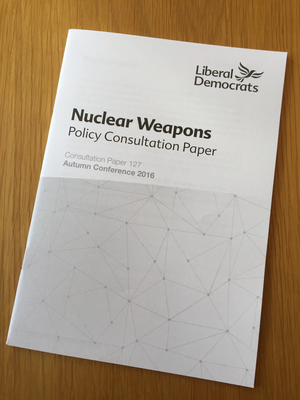The ethics surrounding the nuclear weapons debate

Members of the Nuclear Weapons Working Group are presenting their personal views as part of a wider consultation process into the party's future policy on nuclear weapons. The full consultation paper can be found at www.libdems.org.uk/autumn-conference-16-policypapers and the consultation window runs until 28 October. Party members are invited to attend the consultation session at party conference in Brighton, to be held on Saturday 17 September at 1pm in the Balmoral Room of the Hilton.
The UK's options for the successor to Trident are (boiled down to essentials):
- Same as now - nuclear-armed ballistic missile submarines, only new.
- Keep most or all of the kit but stop continuous nuclear armed submarine patrols, unless circumstances change.
- Shift from missiles in submarines to bombs dropped from aircraft.
- Don't keep nuclear weapons but do keep the expertise and the radioactive materials needed to make them, just in case.
- No nuclear weapons. Unilateral disarmament. The zero option.
I have been invited to write about these options in the light of ethical and humanitarian concerns.
Nuclear weapons are not really weapons of war. They are beyond war. They are means of annihilating life as we know it on this planet. There are about 15,000 nuclear warheads in the world today, which in a full nuclear conflict could comfortably exterminate us all.
They are so destructive that their use in pursuit of a traditional victory is impossible. They are not made to be used, but to make threats with.
The case for the nuclear arsenal rests on deterrence theory: to dissuade foes from certain courses of action, without ever actually being used, in order to make the holder of the deterrent safer.
The doctrine of mutually assured destruction (MAD) assumes that if attacked by a superweapon, the defending state would be able to fire back with a superweapon, and both sides would end up annihilated, so the threat results in tense peace. There are problems with this doctrine such as whether the defending state would have time to retaliate, but no one wants to try it and find out. So we get non-nuclear conflicts and proxy wars.
So far as the UK's part in this elaborate game of bluff and counter bluff is concerned, all depends on the UK's leadership saying they are prepared to use nuclear weapons and being believed. Whether they really would is for potential foes to guess.
From the humanitarian point of view it is imperative never to use a nuclear weapon.
As for ethics: on any theory a liberal or democrat could accept, we cannot attribute collective guilt for the aggression of dictators to the whole population they control, including dissenters, children and babies, not to mention other life forms. We cannot make an ethical argument for using an indiscriminate superweapon against populations, even in retaliation for an attack on us.
So the ethical case must focus on being prepared now or in future to spend what it costs to have a superweapon and to bluff without having a genuine intention of firing it. Again, the ethical obstacles to this are huge.
The MAD doctrine was questioned in the Wall Street Journal in January 2007 where Henry Kissinger and other cold war veterans asserted that nuclear weapons had become a source of intolerable risk, thanks to the risk of accidents, misjudgments or unauthorised use.
There have been accidents; there are ever present risks of sabotage, theft or human error; and the fact that no major detonation has occurred is at least partly due to luck. Weighing the risks, apart from that of attracting an attack, it is legitimate to ask whether the UK's possession of nuclear weapons makes us safer. Should our government bring these weapons on to our territory, with their attendant risks?
* Jo Hayes is a party activist and a member of the Liberal Democrats' nuclear weapons working group.